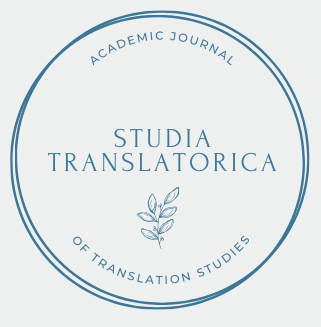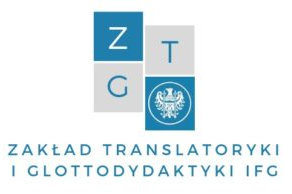Ethical standards
The ethical standards applying in the journal Studia Translatorica were based on the materials of the Polish Ministry of Science and Higher Education and the guideline of the Committee on Publication Ethics – COPE’s Best Practice Guidelines for Journal Editors.
All of the manuscripts submitted for publication in the journal Studia Translatorica are checked for the compliance with ethical standards, credibility as well as for their values and scientific utility.
Obligations of the Editorial Staff, the Editorial Board and the Advisory Board
The Editorial Staff of the journal Studia Translatorica constantly monitors and controls the abiding of the ethical standards related to the publication of texts and counteracts practices non-compliant with the accepted principles.
The Advisory Board has an advisory character. The Editorial Staff of the journal Studia Translatorica can use the advice of the Advisory Board for appointing reviewers as well as for the acceptance of texts for publication or the rejection thereof.
In the journal Studia Translatorica fair play rules are followed. Manuscripts submitted for publication are evaluated in terms of substantive validity. The author’s race, gender, sexual orientation, ethnic and geographical origin, religious and political beliefs in no way influence the evaluation of the texts.
The Editorial Staff of the journal is responsible for taking decisions about accepting texts for publication or rejecting them. The decision about the acceptance or rejection of a text is taken on the ground of the scientific character of the text, the original take on the approached issues, the text’s transparency and its compliance with the profile of the journal.
The Editorial Staff of the journal Studia Translatorica adheres to the rules of anonymity and confidentiality. The Editorial Staff does not disclose information concerning the submitted manuscripts to unauthorized persons. Persons authorized to access to this kind of information are authors of the texts, appointed reviewers, the Editorial Board and the publisher.
The Editorial Staff is not allowed to use the unpublished texts or fragments thereof for their own research without a written consent of their authors. This rule applies also to other persons involved in the publishing process. Commercial considerations do not influence the decisions of the Editorial Staff, which is guided by scientific and ethical standards.
It is the duty of the Editorial Staff of the journal Studia Translatorica to follow the rules of scientific reliability. In order to achieve that the Editorial Staff reserves the right to introduce appropriate changes and decide about the withdrawal of a manuscript from publication in the case of suspected unethical behaviour (such as plagiarism, ghostwriting, guest authorship, the falsification of research results).
The Editorial Staff is always ready to publish appropriate revisions, corrections, explanations or apologies.
The Editorial Staff of the journal Studia Translatorica can consider withdrawing a text from publication if:
- there is clear evidence of unreliable research results and the falsification and fabrication of data, as well as in the case of unintentionally made mistakes,
- the research results were already published in another journal, monograph or joint publication and the author has not informed about this in an appropriate way (a so-called duplicate publication),
- the text bears the marks of unethical behaviour (plagiarism, ghostwriting, guest authorship).
After the decision of withdrawing the text from publication the Editorial Staff is obliged to make an appropriate note public including the title of the article and the surname of the author in the headline. In the note the Editorial Staff provides information about the reason for the withdrawal (in order to distinguish the author’s unintentionally made mistakes from intentional unethical behaviour). The withdrawn text will not be excluded from the published version of the journal (printed as well as electronic version), but the fact of withdrawing the text will be visibly marked.
The authors’ obligations
Reliability is one of its qualitative foundations of the academic world. The readers should be sure that the authors of a publication present the results of their research in a clear, unbiased, reliable and honest way, regardless of the fact that they are the direct authors or that they used the help of a specialized body (a natural or legal person).
In the journal Studia Translatorica only articles of an original character, which were not published or submitted for publication in another journal, monograph or joint publication are published. Submitting the same manuscript for publication in different places is unethical and unacceptable. This applies also to articles published originally in different languages.
The pivotal criterion for the evaluation of a submitted manuscript is also an objective analysis and a presentation of approached issues in a manner which does not raise doubts. Untrue statements, falsified research results, the manipulation of data are considered unethical and unacceptable.
According to the rule of making data available, the author can be asked by the Editorial Staff to present the raw data and research results. The author should save the data in order to be able to provide access to them (also after publishing the text).
The author should not submit a manuscript for publication in which the same research is described, in more than one journal. The submission of the same manuscript to two different journals is unethical and unacceptable.
All persons named as authors or co-authors of a manuscript submitted for publication should actually have made a significant contribution in the creation of the text (for example, the conception, planning, writing, interpretation of the results). All persons, who significantly contributed to the creation of the text should be named as co-authors. The author submitting a manuscript for publication is obliged to make sure that all co-authors familiarized themselves with and accepted the final version of the text and agreed to its publication in the journal.
According to the rule of the reliability of sources, when citing statements, research results or data processed by other authors, the author submitting the manuscript for publication is always obliged to name the sources used. If the author does not know the cited work, copying reference to it from another publication is unethical.
If the author will detect significant mistakes or inaccuracies in his/her text, he/she should immediately inform the Editorial Staff about this in order to withdraw the text or correct it.
The reviewers’ obligations
The appointed reviewers are obliged to immediately inform the Editorial Staff of the journal Studia Translatorica when they are not able to evaluate a text due to the lack of time or qualifications. In such a case the Editorial Staff appoints a new reviewer within 14 days.
All reviewed texts are to be considered confidential documents. The reviewer cannot share and/or discuss the text with third parties (with the exception of authorized persons). Research results, opinions, statements included in the manuscript submitted for publication cannot be used by the reviewer in his/her own research until the text is published.
The reviewer’s evaluation should be objective. Criticism of the evaluated text which is based on personal reasons is inappropriate. All remarks, commentaries and observations should be well-argued and formulated in a clear way.
The reviewer should point out the works not cited by the author. The reviewer is obliged to point out and inform the Editorial Staff about all similarities to other texts.
The reviewer cannot use the evaluated text for his/her private needs and benefit. He/She should not evaluate texts of authors he/she might be in a conflict of interest with. In the case of a conflict of interest the reviewer should immediately inform the Editorial Staff about it.
During the reviewing procedure the following aspects are taken into consideration:
- compliance with the profile of the journal,
- consistent reasoning and the logical structure of the text,
- the choice of adequate research tools,
- the critical evaluation of the research results,
- the correct usage of the subject literature.
In the case when the person submitting the manuscript for publication is suspected of plagiarism, autoplagiarism, ghostwriting, guest authorship, the reviewer is obliged to immediately inform the Editorial Staff about this.
Detailed information about the reviewing procedure are to be found in the bookmark Reviewing procedure.
Proceeding in case of suspected plagiarism, autoplagiarism, guest authorship and ghostwriting
The Editorial Staff of the journal Studia Translatorica pledges to document all displays of scientific unreliability, especially the breaking and violating of ethical rules of the academia.
Plagiarism in all its forms is an unethical practice and is unacceptable. A special anti-plagiarism system is used in order to prevent unethical publication practices in the editorial work of the journal Studia Translatorica.
In the case of suspected plagiarism, the Editorial Staff of the journal Studia Translatorica makes use of a verifying procedure involving the reviewers and the person submitting the manuscript.
Plagiarism and autoplagiarism are an expression of scientific unreliability and all detected cases of it will be made public, including the notification of relevant entities (institutions employing authors, academic societies, science editors’ associations, etc.).
The evidence of a researcher’s ethical attitude as well as the highest editorial standards should be the transparency of information about entities contributing to the publication of every issue (financial, substantive, argumentative contribution, etc.), which is not only the expression of good manners but also social responsibility. Ghostwriting and guest authorship are the opposite of this.
In order to counteract unethical behaviour, i.e. ghostwriting, guest authorship, the Editorial Staff of the journal Studia Translatorica obliges the authors to disclose:
- the contribution of individual authors in the making/writing of the text (with their affiliations and the contribution, e.g. information about who was the author of the conception, the premise, the research method, the protocol, etc. used while preparing the publication), while the author submitting the manuscript bears the main responsibility.
- information concerning the funding sources of the publication, the contribution of research institutions, societies and other entities (financial disclosure).
For this purpose the author is obliged to sign an appropriate statement (to download from the website of the journal Studia Translatorica, from the bookmark For Authors).
The statement can be sent by snail mail or e-mail to the address of the Editorial Staff. By ‘electronic version’ a scan of the statement with a handwritten signature, sent of the *.pdf, *.jpg format is meant.
Ghostwriting, guest authorship are an expression of scientific unreliability and all detected cases of it will be made public, including the notification of relevant entities (institutions employing authors, academic societies, science editors’ associations, etc.).

